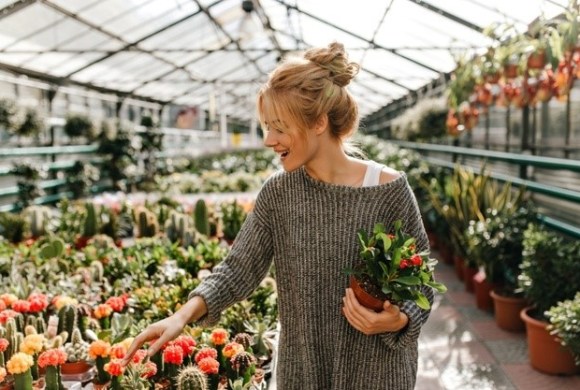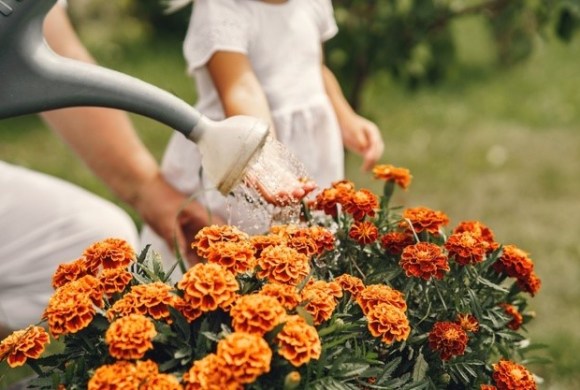Having a hobby is an excellent way to spend your time doing something productive that adds value to your life. Now hobbies can be of different types, and everyone has their likings which come out in their choice of hobby. If you are someone who finds gardening interesting and is looking for tips for gardening at home, we are here for you.
Keep on reading to know a complete beginner’s guide to gardening that is sure to lead you into a more well-planned and proper gardening experience.
Choose The Prime Location for Gardening

Since childhood, we have learned that plants thrive on three things; sunlight, water and soil. So when it comes to starting your own home garden, it is extremely crucial to assess the sunlight in your yard.
Spend some time to know how the sunlight moves in your yard throughout the day. It will make choosing the spot for your garden much easier. Since most edible plants require 5-6 hours of daily sunlight to thrive, following the sun becomes a priority for gardening. This goes as the first and most basic tip to grow your own food in a small space garden.
Choose The Appropriate Plants
Once you finalize the location, it is time to move on to the next step, choosing the plants that will thrive most successfully there.
You need to understand that your brother living in another corner of the continent might have a colorful blooming garden in his backyard, but you cannot copy and paste his plants on your lawn and expect them to grow in a similar thriving manner.
Why? Because of the difference in climate, variation in soil quality and many other factors.
So as a beginner, you should choose native plants that are low maintenance. For example, if you live in an area where winters are extremely cold, then tropical plants like Sebal Minor, Crotons, Vines or Mandevilla won’t survive in your lawn.
Watering And Feeding Your Plants On Time

The trick of feeding and watering your plants is knowing that excess can be hazardous to the plants’ health. The do’s and don’t’s of watering plants can be tricky so do your research well before getting into the hobby.
Hydrate your plants in the morning or evening when sunlight is not too sharp. Remember to water the plants at the soil level. This way, water will get to the roots more quickly. It is suggested to feel the soil with your finger to check for moisture before watering it.
For new and small-sized plants, add a small quantity of fertilizer in the water so that they can get maximum nourishment.
Invest In Gardening Equipment
If you are serious and passionate about gardening, the most important way of helping your transition from beginner to pro-level is by having the right set of gardening equipment for beginners.
It does not matter if you plant in pots, garden beds or in your backyard; you need to have tools to help you out. Gloves, spade, rake, shovels, gardening mat, weed trimmer, all these essential tools are sure to make your chore easier and safe.
Investing in equipment will make you fall in love with gardening.
Make Use Of Compost in Gardening

Fertilizers are rarely the friends for your lawn. The true best friends for your growing plants are compost and manure. These organic additions are sure to spruce up your plants’ growth.
Composting is a cheaper yet effective alternative to fertilizers. Use your kitchen and garden waste for an environment-friendly source of nutrition your plants need.
Prune Your Plants Regularly
Pruning your plants might seem a little boring and time-consuming task. But if you don’t treat your plants like a mother cares for her babies, they will wilt in a matter of days.
Pruning is a basic task for taking care of your plants. It will encourage your plants to grow better, and they will surely appear good as well. If you have grown spring-flowering shrubs in your garden, the optimum pruning time is right after they finish blooming.
Be mindful of pruning them in Autumn because you’ll be removing next year’s bud by then.
Keep Invasive Plants Away From Others

As a beginner, you must know which plants in your lawn are invasive and thus should be kept away from others.
Why? Because they crawl over other small-sized plants and can hinder sunlight from reaching them. This will wilt the smaller and non-invasive plants and make your garden’s overall look bad.
Bottom Line
Gardening is a healthy activity. Seeing your self-grown plants thrive and blossom gives you satisfaction, a sense of achievement and pleases the eyes. This hobby might seem easy on paper, but as a beginner, you need to take care of a few important things to ensure that you successfully plant in your garden.
If you are wondering how to start a garden, remember the above-mentioned tips that are important and easy to implement.



Leave a Reply